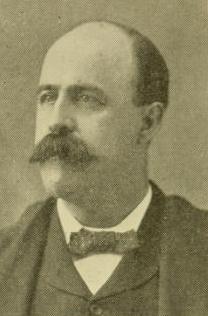Martin Lomasney
Martin Michael Lomasney | |
|---|---|
 | |
| Massachusetts State Senate 3rd Suffolk District | |
| In office 1896–1897 | |
| Preceded by | Michael B. Gilbride |
| Succeeded by | Daniel D. Rourke |
| City of Boston Board of Aldermen | |
| In office 1893–1895 | |
| City of Boston Board of Aldermen 3rd District | |
| In office 1901–1903 | |
| Massachusetts House of Representatives | |
| In office 1899–1899 | |
| Massachusetts House of Representatives 8th Suffolk District | |
| In office 1906–1909 | |
| Massachusetts House of Representatives 5th Suffolk District | |
| In office 1911–1917 | |
| Massachusetts House of Representatives 5th Suffolk District | |
| In office 1921–1922 | |
| Delegate to the 1917 Massachusetts Constitutional Convention[2] | |
| In office June 6, 1917[1] – August 13, 1919[3] | |
| Personal details | |
| Born | December 3, 1859 Boston, Massachusetts |
| Died | August 12, 1933[4] Boston, Massachusetts |
| Political party | Democratic |
| Alma mater | Mayhew School |
Martin Michael Lomasney (December 3, 1859 – August 12, 1933) was a Massachusetts politician. He served as state senator, state representative, and alderman. Lomasney, known as the "Mahatma",[5] was best remembered, however, for being the ward boss (political boss) of Boston's Ward Eight.
Early life
Lomasney was born in Boston, Massachusetts, to Maurice Lomasney and Mary Murray, immigrants from Ireland who had fled the potato famine.
Lomasney's parents and two of his siblings died when he was still a child. After his parents died Lomasney and his older brother, Joseph P. Lomasney, moved in with their aunt.
Lomasney left school when he was in the eighth grade; he then became the leader of a local Irish street gang, and he worked as a bootblack. Lomasney later befriended a local Democratic ward boss and he worked as a lamplighter and a health inspector.
Political career
On March 7, 1894 Lomasney received a bullet wound in the leg in an unsuccessful assassination attempt. His assailant, James A. Dunan, blamed Lomasney for a dispute he had with the Boston Board of Health.[6]
In 1916 the Massachusetts legislature and electorate approved a calling of a Constitutional Convention.[7] In May 1917 Lomasney was elected to serve as a member of the Massachusetts Constitutional Convention of 1917, representing the 5th Suffolk District of the Massachusetts House of Representatives.
Legacy
Lomasney created a famous saying on the importance of discretion: "Never write if you can speak; never speak if you can nod; never nod if you can wink."
A street named Lomasney Way in Boston is named after him. [8]
References
- ^ Journal of the Constitutional Convention of the Commonwealth of Massachusetts, Boston, MA: Wright & Potter printing co., state printers, 1919, pp. 7–11.
- ^ Journal of the Constitutional Convention of the Commonwealth of Massachusetts, Boston, MA: Wright & Potter printing co., state printers, 1919, p. 11
- ^ Journal of the Constitutional Convention of the Commonwealth of Massachusetts, Boston, MA: Wright & Potter printing co., state printers, 1919, pp. 865, 971.
- ^ M. M. Lomasney, Boston Leader In Politics, Dies Pneumonia After Lingering Illness Is Cause of Death, Hartford, Conn: The Hartford Courant, August 13, 1933, p. 9.
- ^ Boston Evening Transcript September 7, 1904
- ^ New York Times, March 8, 1894
- ^ Journal of the Constitutional Convention of the Commonwealth of Massachusetts, Boston, MA: Wright & Potter printing co., state printers, 1919, pp. 7–8, 11.
- ^ http://www.boston.com/yourtown/news/beacon_hill/2012/06/the_life_legend_and_lessons_of.html
Bibliography
- "Martin Lomasney and the Ward Eight". The City Record and Boston News-Letter. 2007-03-15. [1]
Bibliography
- A Souvenir of Massachusetts legislators, (1895), page 133.
- A Souvenir of Massachusetts legislators, (1896), page 131.
- A Souvenir of Massachusetts legislators, (1897), page 118.
- A Souvenir of Massachusetts legislators, (1898), page 118.
- Hennessy, Michael Edmund.: Four Decades of Massachusetts Politics, 1890–1935, (1971), ISBN 0-8369-5700-8, pp 481–484.
- Journal of the Constitutional Convention of the Commonwealth of Massachusetts (1919), pp. 7-8, 11, 865, 971.
- Public officials of Massachusetts, (1921), page 234.
